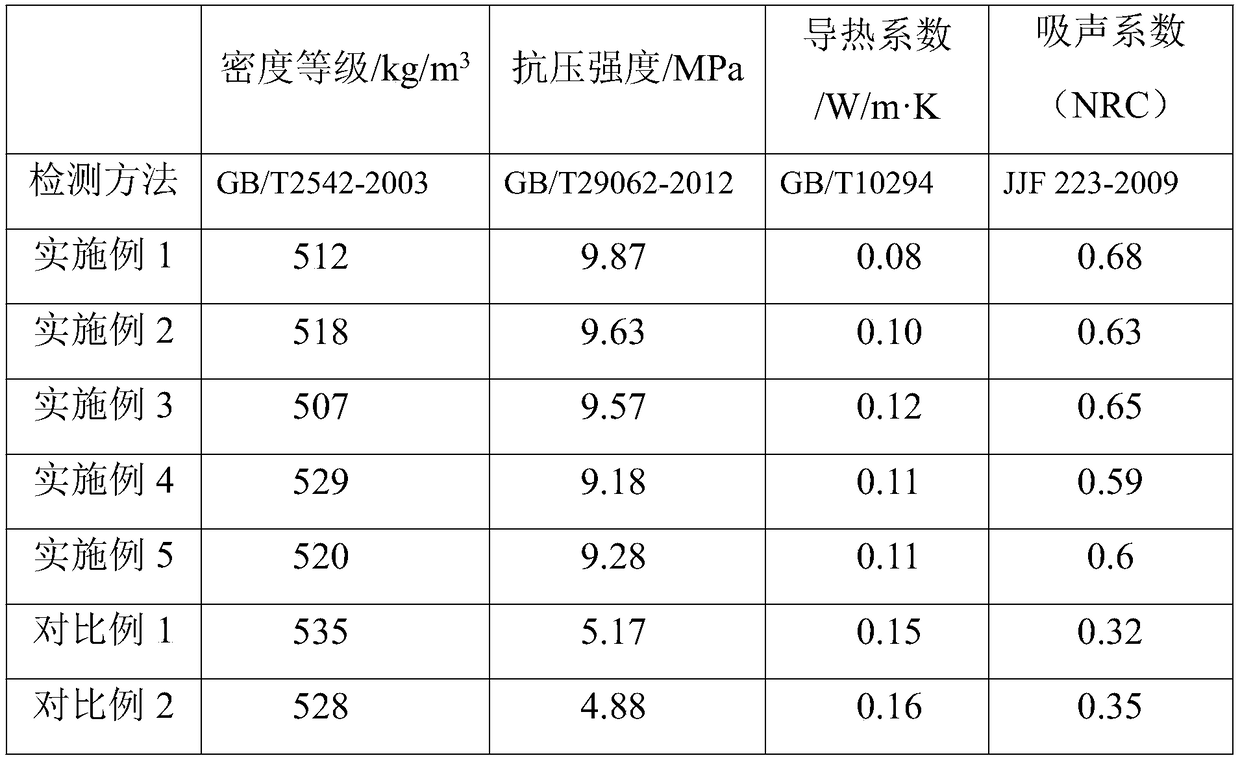Foamed concrete heat insulation board
A foamed concrete and thermal insulation board technology, which is applied in the field of foamed concrete thermal insulation boards, can solve the problems of easy breakage, micro-cracks, and inability to meet building structures.
- Summary
- Abstract
- Description
- Claims
- Application Information
AI Technical Summary
Problems solved by technology
Method used
Image
Examples
preparation example Construction
[0012] The present invention also provides a preparation method of the foamed concrete insulation board, comprising the following steps:
[0013] (1) Put aluminum silicate fiber, polymer powder and second foaming agent in water, ultrasonically react at 80-100°C for 30-45 minutes, and then calcinate at 200-220°C for 10-15 minutes to obtain composite fibers;
[0014] (2) Mix fly ash, cement, fine sand, diatomaceous earth, light calcium carbonate, light aggregate, composite porous fiber and waste rubber under mechanical stirring conditions to obtain a powder mixture;
[0015] (3) After uniformly dispersing the water reducer and other additives in water, add them to the above powder mixture, and continue to stir for 60-150s to obtain a mixed slurry; finally, add the first foaming agent to the mixed slurry, and stir evenly to obtain Concrete precursor;
[0016] (4) The concrete precursor is poured into the mold, and the mold is covered and sealed until it reaches 20-60% of the mol...
Embodiment 1
[0030] (1) Take 22kg of polyethylene terephthalate (U.S. DuPont, FR530-BK), 10kg of aluminum silicate fiber and 5kg of 4,4-oxobisbenzenesulfonyl hydrazide in 100kg of water, then place them in 80°C Ultrasonic reaction for 45 minutes, and then calcined at 200°C for 15 minutes to obtain composite fibers;
[0031] Soak 4kg of waste rubber granules in an acidic solution with a pH of 6-6.5 for 4 hours to obtain acidified rubber, mix the acidified rubber and 10kg of maleic anhydride in water evenly, and stir and react at 100°C for 1 hour to obtain modified rubber;
[0032] (2) Mix 35kg of fly ash, 25kg of cement, 23kg of fine sand, 8kg of diatomaceous earth, 8kg of light calcium carbonate, 10kg of clay ceramsite (1-5mm), 10kg of pumice (1-5mm), and 10kg of polyethylene foam , 8kg composite fiber and modified rubber are mixed uniformly under mechanical stirring conditions to obtain a powder mixture;
[0033](3) Polycarboxylate superplasticizer (model PASP-Ca, purchased from Shandong...
Embodiment 2
[0036] (1) Take 20kg of polyvinylidene fluoride powder (Solvay, 5130 in the United States), 12kg of aluminum silicate fiber and 2kg of 4,4-oxobisbenzenesulfonyl hydrazide in 150kg of water, and then ultrasonically react at 100°C for 30min. Then calcined at 200°C for 15 minutes to obtain composite fibers;
[0037] Soak 3kg of waste rubber particles in an acidic solution with a pH of 6-6.5 for 3 hours to obtain acidified rubber, mix the acidified rubber and 9kg of maleic anhydride in water evenly, and stir and react at 120°C for 1 hour to obtain modified rubber;
[0038] (2) 25kg of fly ash, 35kg of cement, 15kg of fine sand, 12kg of diatomaceous earth, 5kg of polyethylene foam (1 to 5mm), 10kg of castor straw, 12kg of composite fiber and modified rubber under mechanical stirring conditions Mix evenly to obtain a powder mixture;
[0039] (3) 1.5kg polycarboxylate superplasticizer (model PASP-Ca, purchased from Shandong Yuanlian Chemical Co., Ltd.), 1kg sodium dodecylbenzenesulf...
PUM
| Property | Measurement | Unit |
|---|---|---|
| Particle size | aaaaa | aaaaa |
Abstract
Description
Claims
Application Information
 Login to View More
Login to View More - R&D
- Intellectual Property
- Life Sciences
- Materials
- Tech Scout
- Unparalleled Data Quality
- Higher Quality Content
- 60% Fewer Hallucinations
Browse by: Latest US Patents, China's latest patents, Technical Efficacy Thesaurus, Application Domain, Technology Topic, Popular Technical Reports.
© 2025 PatSnap. All rights reserved.Legal|Privacy policy|Modern Slavery Act Transparency Statement|Sitemap|About US| Contact US: help@patsnap.com

